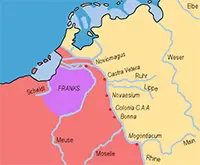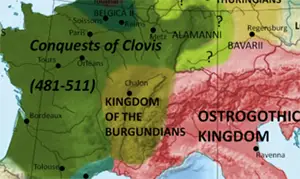The Franks
Part 1: Germanic Traditions and Frankish Conquests The Franks were a Germanic tribe who migrated into Roman territory and, in a few centuries, conquered most of what is now France. 
In the 3rd Century, the Franks migrated across the Rhine River, what was previously a seemingly solid barrier between Roman and "the barbarians." Two of the more prominent of the various Frankish tribes were the Ripuarians and the Salians. About a century after their first migration, the Salian Franks won ally status with Rome and settled between the Meuse River and the Schelde River; as foederati, they had to supply soldiers to the Roman Army but were otherwise autonomous, provided that they didn't cause trouble. The Ripuarian Franks came a bit later and settled along the Rhine, between it and the Meuse. The Salian Franks emerged as the dominant tribe. In the mid-5th Century emerged a king named Chlodio, who paved the way for the Franks' first dynasty, the Merovingians. 
Chlodio's son Merovech was King of the Franks for a decade, from 447 to 457. It was from his name that the dynasty's name comes. His son Childeric I ruled until 482, and his son, Chlodovech I, succeeded him. This was Clovis (left), the first great Frankish king. Clovis was just 15 when he assumed the kingship. At that time, the Frankish capital was at Tournai, in what is now Belgium. Clovis proved a powerful warrior with a magnetic personality, able to inspire his fellow Franks to join him on a campaign of conquest. An early highlight of his reign was the defeat in 486 of the Gallic leader Sygarius, after which Clovis assumed ownership of Gaul. A decade later, the Franks had conquered the Alemanni as well. Clovis had married Clotilda, a Burgundian. She was a Christian, in contrast to the Franks, who at this time were mainly pagan in religious preference. She eventually convinced her husband to become a Christian as well. Following Clotilda's lead, Clovis professed to the Catholic faith. This put him in opposition to some of the other Germanic tribes, who were Christian but were known as Arians because they differed with Catholic Christians on fundamental doctrine. Clovis did, however, have the support of other Catholic kingdoms and of the papacy. 
In 507, Clovis conquered the Visigoths, furthering extending his reign. He demanded tribute from the Burgundians, reducing them to subserviency. By this time, only a southern bit of land along the Mediterranean coast was still outside Frankish control. Clovis established his capital at the relatively centrally located Paris. It was there that he commissioned what would become the Salic Law, a codification of statutes regarding inheritance, migration, and punishment for crimes. Clovis died four years later, having achieved a large amount of territorial acquisition. The Frankish custom was that when a ruler died, whatever survived was divided between all of his surviving sons. This meant that when Clovis died, his four sons divided up all of the territory that he had won. Next page > Victories and Empire > Page 1, 2 |
|
Social Studies for Kids
copyright 2002–2024
David White




